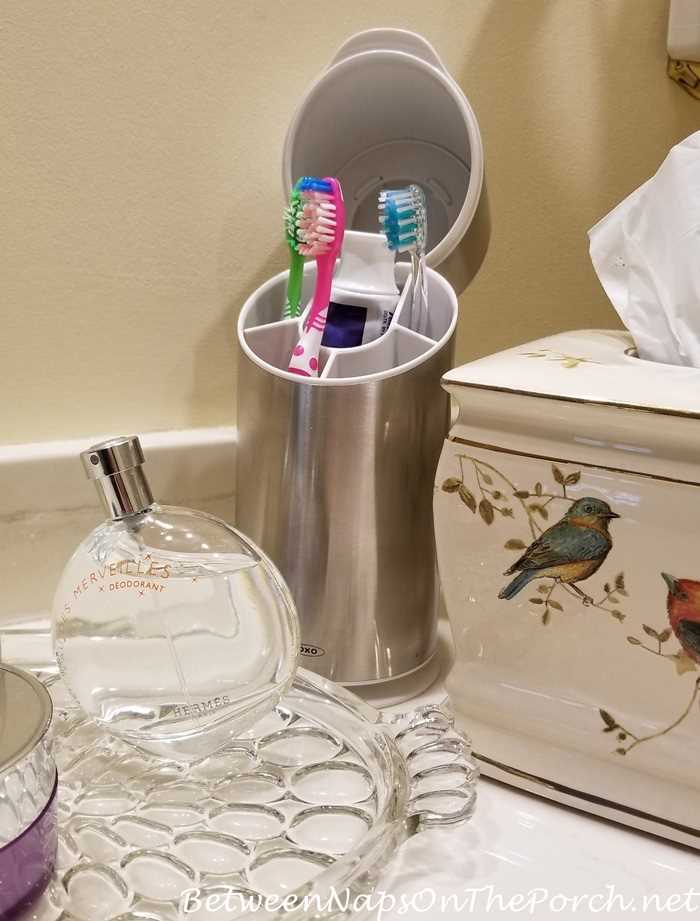
It’s a question that has divided households for years – should you keep your toothbrush in the shower? Some people swear by it, while others think it’s a breeding ground for bacteria. So, what’s the truth?
The short answer is that it depends on your personal preference and the cleanliness of your shower. If you’re someone who meticulously cleans their shower regularly and takes proper care of their toothbrush, then keeping it in the shower might not be a big deal. However, if you’re someone who rarely cleans their shower or is worried about germs, then it might be best to keep your toothbrush in a separate, hygienic place.
One argument in favor of keeping your toothbrush in the shower is that it can be convenient. You can easily brush your teeth while showering, saving time and water. Plus, the steam and warm water can help soften your toothbrush bristles, making them more gentle on your gums. However, it’s important to remember that the shower can also be a humid environment, which can promote bacteria growth.
- The Importance of Toothbrush Hygiene
- Potential Risks of Storing a Toothbrush in the Shower
- Moisture and Bacterial Growth
- The Risks of Bacterial Contamination
- Tips to Minimize Bacterial Growth
- Other Factors to Consider
- Bacteria and Mold
- Water Pressure
- Tips for Proper Toothbrush Storage
- 1. Store upright and allow to air dry
- 2. Keep it separate from other toothbrushes
- 3. Avoid storing in a closed container
- 4. Replace regularly
- 5. Clean your storage container
- Q&A:
- Is it safe to keep your toothbrush in the shower?
- Does keeping your toothbrush in the shower make it more prone to bacteria?
- How often should you replace your toothbrush if you keep it in the shower?
- What are some precautions you can take to keep your toothbrush clean in the shower?
- Are there any alternatives to keeping your toothbrush in the shower?
The Importance of Toothbrush Hygiene

Maintaining proper toothbrush hygiene is essential for oral health and overall well-being. Your toothbrush is an important tool in keeping your teeth and gums clean, so it’s important to take care of it to prevent the growth of bacteria, fungus, and other microorganisms.
Here are some key reasons why toothbrush hygiene should be a priority:
- Prevents bacterial growth: When you use your toothbrush to clean your teeth, it naturally collects bacteria from your mouth. If left unchecked, these bacteria can multiply and lead to oral health issues such as gum disease and tooth decay. Cleaning your toothbrush regularly helps to eliminate these bacteria and keeps your mouth healthy.
- Reduces the risk of infection: If you store your toothbrush in a damp or dirty environment, such as the shower, it can become a breeding ground for bacteria and fungi. These microorganisms can cause infections in your mouth, throat, or even other parts of your body. By keeping your toothbrush clean and dry, you can reduce the risk of infection.
- Prolongs the lifespan of your toothbrush: By properly cleaning and storing your toothbrush, you can extend its lifespan. This means you won’t have to replace it as often, saving you money and reducing waste. Plus, a clean toothbrush is more effective at removing plaque and keeping your teeth clean.
- Improves oral hygiene practices: Taking the time to clean and store your toothbrush properly can also have a positive impact on your overall oral hygiene practices. It serves as a reminder to brush regularly, replace your toothbrush when needed, and maintain good oral health habits.
- Enhances your overall well-being: Good oral hygiene is linked to better overall health. By practicing proper toothbrush hygiene, you can reduce the risk of oral health problems and maintain a healthier mouth. This can contribute to your overall well-being and quality of life.
In conclusion, toothbrush hygiene should never be overlooked. By following simple practices such as rinsing your toothbrush after each use, allowing it to air dry, and storing it in a clean and dry place, you can ensure that your toothbrush remains clean and effective in maintaining your oral health.
Potential Risks of Storing a Toothbrush in the Shower

While it may seem convenient to store your toothbrush in the shower, there are some potential risks to consider. Here are a few reasons why storing your toothbrush in the shower may not be the best idea:
- Bacteria growth: Bathrooms, especially showers, are warm and moist environments, providing an ideal breeding ground for bacteria. Storing your toothbrush in such conditions can promote the growth of harmful bacteria on the bristles, increasing the risk of bacterial contamination.
- Contamination from other bathroom products: Bathrooms are often full of various grooming and personal care products, such as shampoos, soaps, and conditioners. These products can easily splash onto your toothbrush and contaminate it with potentially harmful chemicals or ingredients.
- Exposure to toilet aerosols: Flushing the toilet creates aerosols that can travel through the air and land on nearby surfaces, including your toothbrush. Storing your toothbrush in the shower, which is typically in close proximity to the toilet, puts it at risk of being exposed to these potentially harmful aerosols.
- Mold and mildew: Showers are prone to mold and mildew growth due to the constant moisture. Storing your toothbrush in such an environment can expose it to these fungi, which can then transfer onto the bristles. Ingesting mold or mildew can lead to various health issues.
Considering these potential risks, it is advisable to store your toothbrush in a clean and dry environment, away from the shower. An upright toothbrush holder or a cabinet in your bathroom can provide a safer place for storing your toothbrush. Additionally, it is important to replace your toothbrush every three to four months or sooner if the bristles become frayed or worn out, as this will also help minimize the risks associated with using a contaminated toothbrush.
Moisture and Bacterial Growth
One of the main concerns about keeping your toothbrush in the shower is the potential for moisture build-up. Bathrooms, especially showers, are known for their high humidity levels. When your toothbrush is constantly exposed to moisture, it creates an environment that is conducive to bacterial growth.
Bacteria thrive in warm, moist environments, and the steam from your shower can provide the perfect conditions for these microorganisms to multiply. The damp bristles of your toothbrush can serve as a breeding ground for bacteria, including potentially harmful ones that can be found in your shower water.
The Risks of Bacterial Contamination
Using a toothbrush that is contaminated with bacteria can pose certain health risks. Bacteria that grow on your toothbrush can be transferred to your mouth, potentially leading to infections or other oral health issues. Some of the common bacteria that can be found in bathrooms include Streptococcus mutans, which is known to cause tooth decay, and E. coli, which can cause gastrointestinal problems.
Additionally, if you share a bathroom with other people, keeping your toothbrush in the shower can increase the risk of cross-contamination. The proximity to the toilet, which can release particles during flushing, further adds to the potential for bacterial contamination.
Tips to Minimize Bacterial Growth

If you choose to keep your toothbrush in the shower, there are steps you can take to minimize bacterial growth:
- Rinse your toothbrush thoroughly with hot water after each use to remove any leftover toothpaste, saliva, or food particles.
- Allow your toothbrush to air-dry in an upright position to prevent moisture from accumulating on the bristles.
- Replace your toothbrush every three to four months, or sooner if the bristles become frayed or worn.
- Consider using a toothbrush holder or cover that allows for proper ventilation to keep your toothbrush away from direct water contact.
While it may be convenient to store your toothbrush in the shower, it’s important to weigh the potential risks of bacterial contamination against the benefits of a clutter-free sink. By following proper hygiene practices and taking precautions, you can help minimize the chances of bacterial growth on your toothbrush.
Other Factors to Consider

While the shower might seem like a convenient place to store your toothbrush, there are some factors to consider before making that decision:
Bacteria and Mold
One concern about keeping your toothbrush in the shower is the potential for bacteria and mold growth. The warm and humid environment of the shower provides an ideal breeding ground for these microorganisms. If you don’t thoroughly rinse and dry your toothbrush after each use, bacteria and mold can multiply and contaminate the bristles. This can then lead to oral health problems if you continue to use the contaminated toothbrush.
Water Pressure
Another factor to consider is the water pressure in your shower. If your shower has strong water pressure, it could cause splashing and splattering of water onto your toothbrush. This can introduce additional bacteria and contaminants onto the bristles. It’s important to keep your toothbrush covered or inside a toothbrush holder to prevent this from happening.
In addition to these factors, it’s also important to replace your toothbrush regularly. Regardless of whether you keep it in the shower or elsewhere, toothbrushes should be replaced every three to four months or sooner if the bristles become frayed. This ensures that you are using a clean and effective toothbrush for maintaining good oral hygiene.
Tips for Proper Toothbrush Storage
Proper toothbrush storage is important for maintaining good oral hygiene and preventing the growth of bacteria on your toothbrush. Here are some tips for storing your toothbrush properly:
1. Store upright and allow to air dry
After each use, thoroughly rinse your toothbrush with water and store it upright in a toothbrush holder or cup. This allows it to air dry and prevents moisture from accumulating, which can promote the growth of bacteria.
2. Keep it separate from other toothbrushes
Avoid storing multiple toothbrushes together in the same holder, as this can lead to cross-contamination. Each toothbrush should have its own designated space to prevent the spread of germs.
3. Avoid storing in a closed container
It’s best to avoid storing your toothbrush in a closed container or plastic bag, as this can create a damp environment that bacteria thrive in. Instead, opt for an open-air storage solution that allows for ventilation.
4. Replace regularly
Even with proper storage, toothbrushes should be replaced every three to four months or sooner if the bristles become frayed or worn. This ensures that you are using a clean and effective toothbrush for optimal oral health.
5. Clean your storage container
Regularly clean your toothbrush holder or cup with hot water and soap to remove any bacteria or debris that may accumulate over time. This helps maintain a clean storage environment for your toothbrush.
| Do’s | Don’ts |
|---|---|
| Store toothbrush upright | Store toothbrush in a closed container |
| Allow toothbrush to air dry | Store multiple toothbrushes together |
| Keep toothbrush separate from others | Use a dirty or worn toothbrush |
| Replace toothbrush every 3-4 months | Store toothbrush in the shower |
| Clean toothbrush holder regularly |
Q&A:
Is it safe to keep your toothbrush in the shower?
Yes, it is generally safe to keep your toothbrush in the shower. However, there are some precautions you should take to ensure proper hygiene.
Does keeping your toothbrush in the shower make it more prone to bacteria?
Keeping your toothbrush in the shower can make it more prone to bacteria due to the warmth and humidity of the environment. It is important to take steps to minimize the risk of bacterial contamination.
How often should you replace your toothbrush if you keep it in the shower?
If you keep your toothbrush in the shower, it is recommended to replace it every three to four months or sooner if the bristles become frayed or worn.
What are some precautions you can take to keep your toothbrush clean in the shower?
To keep your toothbrush clean in the shower, you can rinse it thoroughly after each use, store it in an upright position to allow it to air dry, and consider using a toothbrush holder with ventilation.
Are there any alternatives to keeping your toothbrush in the shower?
Yes, if you are concerned about the hygiene of keeping your toothbrush in the shower, you can consider storing it in a dry area outside of the bathroom, such as a medicine cabinet or drawer.